Premise
14 year-old Gloria Dupont (Glo) is working as an assistant to a government minister in Milchea’s capital city Peoria. When communication lines go down across the city on the day of a key parliamentary referendum, Glo is sent rushing across the city to deliver messages that could change the course of the vote and the future of her nation.

Idea/Purpose:
The intention was to create a story about the power of controlling information and its flow, as well as political corruption, colonization, and the cycles of violence.
Iteration and Key Feedback
Most of the iteration the game went through involved me learning how to best use different Inform constructs. As a programmer, I found Inform’s natural language structure to be pretty confusing. Over time, I found the best ways to create the events and systems I wanted in the game with the help of collaborators in class.
Getting more specific, each iteration of the game resulted in a world that was more full and fleshed out. Testers generally expressed that the most frustrating parts of parser fiction games were when you thought you should be able to examine or interact with something, but the game wouldn’t let you. Therefore, I focused on adding individual descriptions (and utility, where appropriate) to every object in a room. As you see below, the descriptions didn’t need to be lengthy to satisfy players; they just needed to be there. A downside to this was that I didn’t have time to add all of the rooms I wanted, but I think this approach fit more with the “quality over quantity” goal. Most importantly, this makes the world feel more “real,” which is essential for making the player feel empathy for the characters and the situations they’re in.
Before:
 \
\
After:

Some playtesters also asked for more instruction on what actions they were able to do. I came to this project from the perspective of an experienced parser fiction player, and I initially assumed that my audience would be similarly experienced. I realized during testing that many people in the class hadn’t played parser fiction before, or at least had only played it for the P2 intro assignment. This led me to add more “tutorial” text, as pictured below.

Reflection
If given another opportunity, I would tamper my expectations of what I could accomplish given such a short development period. I planned out a story with a very large scope, and I ended up not being able to complete most of it. I’m really passionate about this story, and I’m sad I wasn’t able to give it a proper conclusion before the end of the project period. Hopefully, I’ll get to work on this for the final project!
Game Link: https://ivorykimber.itch.io/change-of-address
Password: fun
Tutorial
Available Actions
- Examine [thing]/look at [thing]
- Take [object]
- Open [container]
- Go [cardinal direction]
- Enter [room]/Leave [room]
- Talk to [person]
- Give [object] to [person]
- Knock on [door]
How to exit the “tutorial” room (Caryn Allard’s office)
- Action 1 (Hover to see)
- Action 2 (Hover to see)
- Action 3 (Hover to see)




Despite its early stages, this game is rich in complex values such as political power and corruption, information manipulation, and loss of innocence. Because the first area of the game is so fleshed out, the player can glean a lot of information about the nation of Milchea’s information and political systems. For example, we know they use “Consoles” to communicate and these seem to be somewhat unreliable (I suspect a malicious actor is behind the communication breakdown). We also know this is a world ruled by an obtuse and powerful bureaucracy which from the letters on the minister’s bureau and the self-important interior design of the office seems rife with political malfeasance. As they examine the room, the player asks themself who the political players are and what role they themself will play in the ensuing drama. Compounded, these design choices clearly signal and reflect the two key values of political influence and information control. Furthermore, after inspecting the lamp, we learn that the protagonist is 14 years old; old enough to begin to understand the workings of people and government but too young to have put all the pieces together. Therefore, it becomes clear that this IF will also be a coming of age story and highlights the loss of innocence as one of its principal values.
Thanks to all of the information I gathered from the Minister’s chamber, I learned a lot about the Milchea. The attention to detail made me care about the world and the things happening in it. I felt excited to join the fray and start making decisions that affected Milchea and its people. The game is a perfectly executed example of parser fiction and it uses the medium to its maximum. By sticking to the fundamentals of examining things and moving in cardinal directions, the player can imagine and navigate the world in a manner completely unique to the medium of parser fiction.
One thing I thought was particularly well-executed was the writing; crisp, objective, strong writing. No sentence was wasted on poetic niceties and every phrase gave me a useful piece of information, allowing me to better understand the world I was navigating. There are two things I would improve for P4. The first is obvious… finish the story, as for now it reaches up to a “call-to-arms” or an inciting incident. The second is I was sad that Glo got a lamp for her birthday because although a lamp can really tie a room together it doesn’t seem like a very exciting and fun present.
In Change of Adress, the premise is clear right away, which does an excellent job of setting up the dystopia and the values it may be trying to reinforce— the costs of surveillance society, the dangers of a lack of privacy.
I am not the best at parser fiction, and so it took me some time to get used to exploring (and also downloading because I don’t have windows lol), but wow, I think the medium really reinforced certain themes— surveillance, limited actions available. You really have to pay attention to detail, which is important in both the context of parser games but also the world at hand. Another thing that is reinforced by both the game and core mechanics is the limited amount of actions you are able to take; the limits of parser fiction and the limits of the in-game world interweave nicely. Also, I like that when a command isn’t possible, in some cases the response is in line with the narrative (i.e. you try to go west but the game says “You’re generally not supposed to leave unless sent by the Minister. You can’t imagine how much trouble you’d be in if they showed up with a task and you were gone. Shudder. “
There is also a lot of cool world-building that takes place, from setting the scene in turn of the century Milchea to Kaiyen. Again, being able to envision oneself in this world help to reinforce the values by empathy during gameplay, which I thought was really cool.
In terms of caring about the topic, I think that the parser fiction does a good job of doing that through establishing the Milchean narrative and making you feel the limitations and downsides of the society as a character. Through this empathy, the themes are reinforced, and so I think the medium reinforces the message and vice versa. That was one thing that was awesome about it. One point of improvement if you want the game to be accessible to non-experienced parser people is adding hints or placeholders on prompts. On first play, I was having a lot of difficulty, but then I realized that I really had to pay attention and that made it more fun + I was able to read the blog post which helped me brainstorm commands. If someone is a normal, experienced parser player, however, I think that that is fine though.
Game is really good!